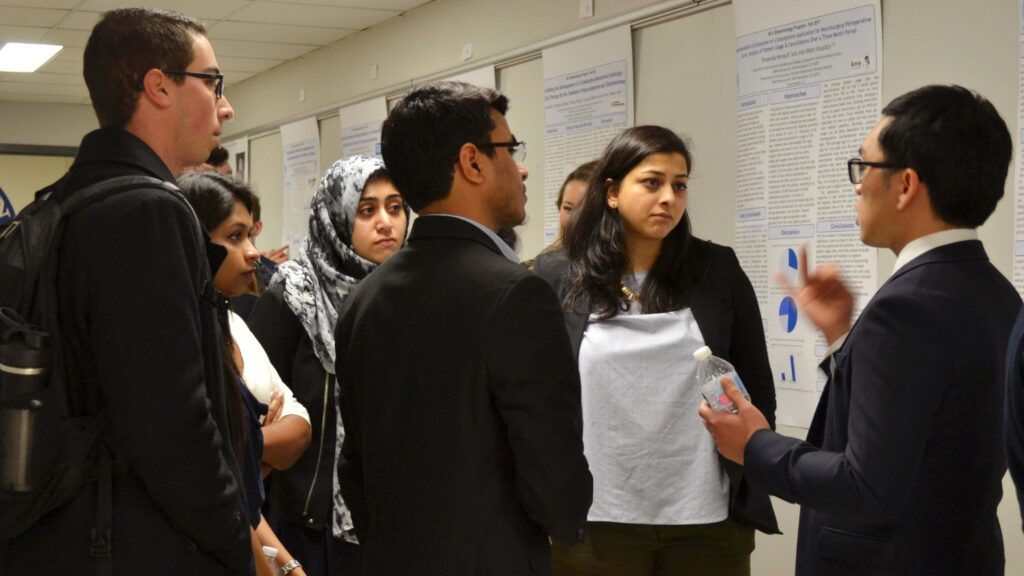The Entrepreneurship Track is a highly selective track that aims to introduce life scientists to entrepreneurship and core business functions. Applicants applying to this track will be interviewed and selected by the Program Director.
Topics covered will include establishing a biotechnology company, raising angel and venture capital funding, protecting scientific inventions with intellectual property, managing product development, and skills required to recruit and manage the various functions of a startup company.
What You’ll Learn
Our Biotechnology Program has a longstanding track record for life science entrepreneurship. The founding Program Director was an academic entrepreneur who was the founder of Life Technologies, now a part of Thermo Fisher and four additional biotechnology companies. Two of the companies became publicly traded companies. Likewise, the current Program Director founded several biotechnology companies, and our teaching faculty members have achieved remarkable private sector success.
The Entrepreneurship Track has many unique features:
- Fall semester enrollment only
- Small cohort of three to eight students
- Laboratory Applications course (BIOT 5007/5008) is not required
- Tools for Entrepreneurship (BIOT 6002) is a core course that is not available to other track students
- For the Capstone Internship (BIOT 7950) students will be encouraged to intern in entrepreneurial settings. The project must be business-related; the final report deliverable is replaced with a 20-slide PowerPoint summary of the project and an oral presentation to judges (separate from poster presentation)
- 16 credits of business core courses versus 9 credits in other tracks
- 7 credits of science core courses versus 13-14 credits in other tracks
Fall 2024 Admissions
Review our program prerequisites and begin your online application.
Track Admission Requirements
- Admission into the M.S. in Biotechnology Program
- Applicants applying to this highly selective track will be interviewed and selected by Program Director
- Minimum of one year paid work experience or prior experience in entrepreneurial settings
- Good verbal and written English language skills
- Possess a strong desire to be immersed in the business end of the industry and a goal to continue in that space after graduation
- Satisfactory interview by the program director or designee for final consideration
Courses
Capstone Internships
Students gain real-world experience at biotech companies, agencies and other institutions through our capstone course.
Example Degree Plan
The following is an example degree plan for full-time students, who finish the program in 10 months (two semesters). Our program charges a full-time, per-semester flat rate for students taking 12 credits or more in a semester and a part-time, per-credit rate for students taking fewer than 12 credits.
Fall
| Course Name | Credit(s) |
|---|---|
| BCHB 5140 Introduction to Bioinformatics | 1 |
| BCHB 5540 Research Ethics & Integrity | 0 |
| BIOT 5009 Introduction to Biotechnology Industry | 3 |
| BIOT 5200 Financial Matrix in Biotechnology | 1 |
| BIOT 5230 Intellectual Property | 2 |
| BIOT 5590 New Frontiers of Biotechnology | 1 |
| BIOT 6002 Introduction to Tools for Entrepreneurship | 2 |
| BIOT 6590 Introduction to Biotechnology Internship | 0 |
| BIOT 7130 Principles of Biochemistry | 3 |
| Elective 1 | 1 |
| Elective 2 | 1 |
| 15 Credits |
- Students pay the per-semester rate.
- Apply for graduation in your second-to-last semester. Follow the Graduating Student Checklist.
Spring
| Course Name | Credit(s) |
|---|---|
| BIOT 5100 Entrepreneurial Biotechnology | 3 |
| BIOT 5160 Molecular Medicine | 2 |
| BIOT 5430 Current Good Laboratory and Manufacturing Practices (cGLMP) for Biotechnology | 1 |
| BIOT 5500 Management Strategies for Biotech Companies | 1 |
| BIOT 5510 Commercialization for the Biotechnology Industry | 1 |
| BIOT 5660 Drug Development to Post Approval | 1 |
| BIOT 6430 FDA Case Studies | 1 |
| BIOT 7950 Biotechnology Capstone Internship | 4 |
| BIOT 8001 Portfolio & Project Management | 1 |
| 15 Credits |
- Students pay the per-semester rate.
- Follow the Graduating Student Checklist to receive your degree and attend Commencement with your class.


